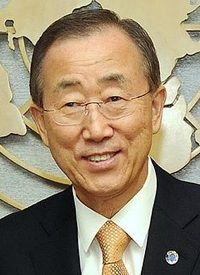
United Nations Secretary General Ban Ki-moon (left) called on world leaders Monday to collaborate in financing a multibillion-dollar fund to combat global warming. Speaking at a conference in Bangladesh’s capital, Mr. Ban said global efforts must be taken to establish a $100 billion Green Climate Fund dedicated to taming the “damaging” effects of climate change, and that the global economic crisis should not hinder such efforts.
“The aim of this conference is to get the nations who are disproportionately affected by climate change, the most vulnerable nations, to come together and speak with one voice,” asserted Bangladesh’s environment secretary Mesbah ul Alam. “Climate change is real and it is affecting us now — we live with floods, with climate refugees, with rising salinity in our coastal areas and with the impact of rising sea levels.”
Delegates at a climate change conference beginning November 28 in Durban, South Africa, are to consider options to raise $100 billion a year for the fund, which was established last December to aid countries reportedly most affected by climate change. “Governments must find ways — now — to mobilize resources up to the $100 billion per annum pledged,” Ban professed. “An empty shell is not sufficient.”
Representatives of about 20 countries in the Climate Vulnerable Forum (CVF), a global partnership of nations “disproportionately affected by global warming,” are meeting for two days in Dhaka to form an agenda to curb the effects of global warming in nations with heightened socio-economic and environmental vulnerabilities. The forum was founded at the initiative of the Maldives government, by President Mohamed Nasheed, and first organized at a meeting in November 2009. Eleven countries founded the CVF, including Bangladesh, Kenya, Nepal, Vietnam, and Rwanda, and dozens of others now participate in its initiatives.
Bangladeshi Prime Minister Shekh Hasina deplored that responses from the global community have been displeasing. “Climate change has been seriously affecting us. We are bearing the brunt of the damage though we made negligible or no contribution to the menace. This constitutes a serious injustice and must be acknowledged by the global community,” she said.
The UN Secretary General hoped that the forum will develop a strong and cohesive position at the Durban conference, which is projected to attract more than 190 countries. “I will count on the members of this forum to arrive with a strong united voice,” averred Ban. “In this time of global economic uncertainty, let your commitment to green growth be an inspiration to more developed countries — the major emitters,” he added. “Even in these difficult times, we cannot afford delay.”
The Durban conference also intends to resolve a new compromise on the Kyoto Protocol, a failed initiative which requires participating industrialized nations to commit themselves to modest reductions of various forms of greenhouse gases. However, the international effort to curb manmade greenhouse gas emissions has spurred no demonstrable reductions.
The United States ultimately rejected Kyoto, as political and business leaders warned that agreement to join the international effort would stifle the American economy. Further, U.S. federal officials believed reductions should have been required of developing nations such as China and India. U.S. resistance to the protocol, and concerns over poverty and economic stagnation — particularly due to the global economic crisis — have up until now suppressed talks on a pact to succeed Kyoto.
While Mr. Ban and the CVF argue that more needs to be done to battle the global warming “problem,” critics may point out that the climate change wishing well has dried up, even in industrialized nations, where billions of dollars have been shoveled out in domestic environmental policies. The United States is one country that has spent enormous sums of money on climate change projects, and Washington continues to dump taxpayers’ dollars into “green” investment projects.
And so far, the only observable outcome is a backwash of oppressive regulations and mounting government debt.



